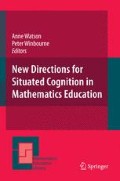Abstract
This chapter reports on a small-scale case study involving 15-16 year old secondary school students participating in a vocational module under the General National Vocational Qualification (GNVQ) scheme that operated in England during the late 1990s. The development was a pilot study involving experience in the workplace in a small-scale light engineering context. An initial aim of the study was to explore the potential of the setting for the development of numeracy practices. The theoretical framework adopted is based on a social perspective on learning and a view of learning mathematically as social practice. Of particular interest were the differences between everyday and school mathematical practices. The analysis focuses on differences in the practices between the settings of workplace and school in particular. Finally issues to emerge from this study are discussed in relation to the wider context of policy and practice. These include issues of relevance, questions of purpose, learner confidence and approaches to assessment in mathematics.
Access this chapter
Tax calculation will be finalised at checkout
Purchases are for personal use only
Preview
Unable to display preview. Download preview PDF.
References
Carlgren, I. (2005). The content of schooling - from knowledge and subject matter to knowledge formation and subject specific ways of knowing, ECER 2005 - European Conference on Educational Research. Dublin: University College Dublin.
Cockcroft, W. (1982). Mathematics counts: Report of the committee of inquiry into the teaching of mathematics in schools. London: HMSO.
Cooney, T. (1985). A beginning teacher’s view of problem solving. Journal for Research in Mathematics Education, 16 (5), 324-336.
Crawford, K. (1996). Vygotskian approaches in human development in the information era. Educational Studies in Mathematics, 31(1-2), 43-62.
Davydov, V. V. & Markova, A. K. (1983). A concept of educational activity for children. Soviet Psychology, 21(2), 50-76.
Ford Corporation. (1984). Statistical process control: A guide to the use of statistical process control to improve quality and productivity: Ford Corporation. Product Quality July 1984 EU880.
Gipps, C. (1994). Beyond testing. London: Palmer.
Hudson, B. (1998). Learning mathematically as social practice in a workplace setting. In A. Watson (Ed.), Situated cognition and the learning of mathematics (pp. 71-80). Oxford: University of Oxford, Centre for Mathematics Education Research.
Lave, J. (1988). Cognition in practice. Cambridge: Cambridge University Press.
Lave, J. (1996). Teaching, as learning, in practice. Mind, Culture and Activity, 3(3), 149-164.
Lave, J., & Wenger, E. (1991). Situated learning: Legitimate peripheral participation. Cambridge: Cambridge University Press.
Leontiev, A. N. (1978). Activity, consciousness and personality. Englewood Cliffs, NJ: Prentice Hall.
Lerman, S. (1996). Culturally situated knowledge and the problem of transfer in the learning of mathematics. Research group for social perspectives on mathematics education. London: University of London, Institute of Education.
Ongstad, S., Hudson, B., Pepin, B., Imsen, G., & Kansanen, P. (2005). Didaktik and/in mathematics education. Studying a discipline in international, comparative and communicational perspectives. Oslo, Norway: Oslo University College.
Pozzi, S., Noss, R., & Hoyles, C. (1998). Tools in practice, mathematics in use. Educational Studies in Mathematics, 36, 105-122.
Smith, A. (2004). Making mathematics count: The report of inquiry into post-14 mathematics education: London: DfES.
Thom, R. (1973). Modern mathematics: Does it exist? In A. G. Howson (Ed.), Developments in mathematics education: Proceedings of the second international congress on mathematics education (pp. 194-209). Cambridge: Cambridge University Press.
Thompson, A. G. (1984). The relationship of teachers’ conceptions of mathematics teaching to instructional practice. Educational Studies in Mathematics, 15(2), 105-127.
Vygotsky, L. S. (1962). Thought and language. Cambridge, Mass: MU Press.
Author information
Authors and Affiliations
Editor information
Editors and Affiliations
Rights and permissions
Copyright information
© 2008 Springer Science+Business Media, LLC
About this chapter
Cite this chapter
Hudson, B. (2008). Learning Mathematically As Social Practice In A Workplace Setting. In: Watson, A., Winbourne, P. (eds) New Directions for Situated Cognition in Mathematics Education. Mathematics Education Library, vol 45. Springer, Boston, MA. https://doi.org/10.1007/978-0-387-71579-7_13
Download citation
DOI: https://doi.org/10.1007/978-0-387-71579-7_13
Publisher Name: Springer, Boston, MA
Print ISBN: 978-0-387-71577-3
Online ISBN: 978-0-387-71579-7
eBook Packages: Humanities, Social Sciences and LawEducation (R0)

